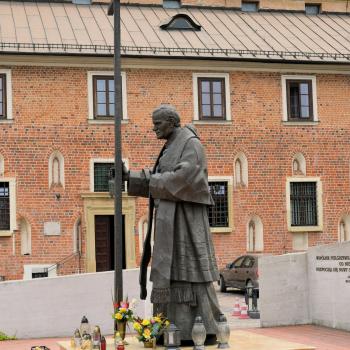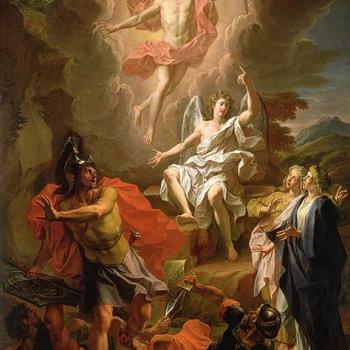Lectionary Reflections
Acts 1:6-14
June 1, 2014
I doubt Ascension Sunday is your favorite Christian holiday, but it has its importance in the arc of the narrative of Jesus as he leaves the disciples for the last time and prepares them for the coming of the Holy Spirit of God at Pentecost. It is still another way that Luke employs to help the early church live with the absence of Jesus and the apparent delay of his parousia, his expected second coming. It is quite obvious from Acts 1:11 that many of the early converts to the new faith had focused keen attention on that belief that the resurrected Christ would soon be returning to the earth in power and majesty. Hence their question to him in Acts 1:6: "Lord, is this the time when you will restore the kingdom to Israel?"
That is a most revealing question, packed with implications for early Christian beliefs. Many early believers, modeled by the two devastated disciples trudging down the Emmaus road in Luke 24, had thought that Jesus was "the one to redeem Israel" (Lk. 24:21). Obviously, they ironically say to the unrecognizable Jesus himself, they were wrong, since he had been arrested, tried, and murdered. Their dream of a redeemed, a restored, a new beginning for Israel had been dashed. And now, after his resurrection and before his final return to God, the followers apparently have revived the dream of Israelite restoration.
Yet, there is a difference in the two hopes. In the Luke passage the Emmaus disciples hope for " a redeemed Israel"; one might also translate the phrase there "a setting free of Israel." This hope sounds distinctly political. Jesus in his inaugural sermon in Luke 4, quoting Isaiah 61, announces that he has been sent by God to "allow the oppressed to go free." The Emmaus duo sound that note in their despair: we had thought that Jesus' life and ministry would lead to Israel's freedom, freedom from Roman oppression, freedom for a new burst of Israelite power and glory. In Acts the viewers of the ascending Jesus ask something slightly different; they ask after the "restoration of the Israelite kingdom." Their hopes sound rather more grand. They too mean the removal of Roman hegemony, but more than that they mean the return of genuine power for Israel, a day of new Davidic strength.
Of course, the problem for both hopes is the terrible fact that with the death and resurrection of Jesus precisely nothing has changed; the Romans are still evident on every street corner of the land, and Israel remains that pathetic far-flung outpost of the Roman Empire and shows few signs of ever becoming anything else. Their king is another debauched member of the Herodian line of half-breeds, and the governor is a despotic and cruel tool of the overlord Rome.
Jesus' reply does nothing to lift their spirits: "The times and seasons that the Father has reserved to his own authority are not for you to know. Instead, you will receive a power from the Holy Spirit coming upon you. And you will be my witnesses in Jerusalem and in all of Judea and Samaria and to the end of the earth" (Acts 1:7-8). The answer to the question, "Is it time for us to get our power back?" is "you can not know such things, but instead of such idle and foolish speculation the Holy Spirit will soon give you real power, not to be great and grand and admired, but to be witnesses everywhere."
But like the dunderheads they have long been, the disciples watch in silent awe as Jesus is enveloped in a cloud a la Elijah and disappears. I always imagine that Luke has in mind a rather long period of time between verses 9 and 10. The disciples, slack-jawed yokels that they are, crane their necks more and more, gazing longingly into the skies, and perhaps begin, in the backs of their tiny brains, the calculations that they feel they must make to predict just when Jesus will be coming back, avoiding completely the warning that Jesus himself has just given that there is no way that any human can know such things, since that information is God's alone.
Luke makes this truth clear when two white-robed men appear in the clouds and chide the silent lookers with a sharp "Men of Galilee, why do you stand looking into heaven?" Why, indeed? Jesus has just made it crystal clear that the restoration of Israel under the magic power of a returning and furious warrior Jesus is not on offer. He will come back, they say, in the same way that he went, but heaven-gazing with increasingly aching necks is not the work of a true disciple of Jesus. Real disciples head for the places of Holy Spirit power, a power that will make them witnesses, proclaimers of the evangel of Jesus the Christ, the one who has come to release captives, to pay special attention to the disabled and all marginalized of the society, to see the places where oppression is rampant and speak against it; in short, to proclaim the gospel to the poor, a gospel that includes the announcement of God's good favor to all.





